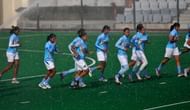A coach of high caliber like you is always instrumental in the successful performance of a team. Do you think the coach gets all the acclaim and recognition he deserves on par with the team captain or team manager?
Hockey is a team sport. All the officials and players should have like mindedness and a common goal – and should strive to achieve that target. Though as a coach or as a supportive staff, you may not be their in the main picture, but recognition will follow you automatically. At the end, it is the satisfaction that you get as a member of the team in realizing the goals.
Is there much gap between coaching and fitness training standards in India and other countries?
There is difference in coaching standards to a great extent, as our Indian coaches do not believe in video analysis, and does not plan and strategise their game plan accordingly. Most of our coaches believe that by just playing game among the campers – all the elements of technique and tactical development, strategy and team combination will automatically be developed. This is one of the biggest drawback in our preparation for any competition.
The physical fitness training is common all over the world, but we are with limited scientific resources to analyse the physical demand during the game and during the specific training drills. Therefore, most of the time players are not pushed to their optimum limits while training, assuming injury would take place. This limits our performance to a great extent when it matters most.
Indian teams have to play in varied climatic conditions in Australia, Germany, Spain, Poland, France, Switzerland, Holland, America Japan, Malaysia etc. How do you cope with the ‘climate’ factor in coaching and fitness training of the Indian team?
Frankly speaking, adapting to climatic conditions is very essential for a competition. The individuals too respond to varied to climate conditions. It is not just the climate alone but the need to get adapted to the food, bio rhythm and change in time, etc. There are strategies and varied approach through which this can be accomplished. But, with limited resources and support from the government, the teams are just cleared 1 day before the tournament. There have been many occasions we have traveled and played tournaments with jet lag, and to some extent with hardly five hours gap between landing and playing matches.
Are there any great attitudinal differences between Malaysian players and Indian players?
Certainly there are many attitudinal differences. Indian players, if they get a ball and some space to play – they train even without a coach and it is vice versa in Malaysia. But Malaysian players, when they are on the ground, they are united as a team and have a strong bound among themselves. In India, our players classify themselves as south and north and also mix among their state players only. This division is clearly visible when any selection trials takes place.
You have the vast and varied experience of coaching not only hockey players but also footballers, cricketers, kabaddi players, swimmers, etc. Can you say which gave you the ‘utmost’ satisfaction?
For me, each training session carried out is satisfaction whether it is for athletes with different level of performance or gender or status of sports in relation to the society. I don’t give any special preferences to any sportsman or any sport, but look up to them as individual and specific performers who needs the right training. But I feel elevated to a kind of extreme happiness, when the athletes achieve glory.

